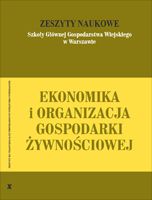Main Article Content
Article Details
BOĆ J., NOWACKI K., SAMBORSKA-BOĆ E., 2000: Ochrona środowiska, Wyd. Kolonia Limited, Wrocław.
DAVIES, A., FAHY, F., RAU, H., 2014: Challenging Consumption: Pathways to a More Sustainable Future, Routledge, London.
de-MAGISTRIS T., GRACIA A., 2016: Consumers' willingness to pay for sustainable food products: the case of organically and locally grown almonds in Spain, Journal of Cleaner Production 118, 97-104.
FURNHAM A., 1984: Many sides to the coin: the psychology of money usage, Personality and Individual Differences 5, 501-509.
GRUNERT K.G., 2005: Food quality and safety: consumer perception and demand, European Review of Agricultural Economics 32, 3, 369-391.
JENSEN K.K., SANDOE P., 2002: Food Safety and Ethics: The Interplay between Science and Values, Journal of Agricultural and Environmental Ethics 15, 245-253.
KIEŁCZEWSKI D., 2008: Konsumpcja a perspektywy zrównoważonego rozwoju, Wyd. Politechniki Białostockiej, Białystok.
MIZERA K., 2011: Trendy w konsumpcji - w kierunku zrównoważonego rozwoju, Uniwersytet Opolski, Opole.
PEARSON D., HENRYKS J., JONES H., 2011: Organic food: What we know (and do not know) about consumers, Renewable Agriculture and Food Systems 26.2, 171-177.
SALLEH M.M., ALI S.M., 2010: Consumer's perception and purchase intentions towards organic food products, Canadian Social Science, 6.6, 119-129.
SŁABY T., 2006: Konsumpcja. Eseje statystyczne, Difin, Warszawa.
SZUBSKA-WŁODARCZYK N., 2014: Analiza popytu na produkty Sprawiedliwego Handlu, Konsumpcja i Rozwój 4 (9), 40-51.
SZUL E., 2012: Dekonsumpcja - moda czy sposób na kryzys, Nierówności Społeczne a Wzrost Gospodarczy 24, 316-328.
TAPIA-FONLLEM C., CORRAL-VERDUGO V., FRAIJO-SING B., DURÓN-RAMOS M., 2013: Assessing Sustainable Behavior and its Correlates: A Measure of Pro-Ecological, Frugal, Altruistic and Equitable Actions, Sustainability 5 (2), 711-723.
VECCHIO R., ANNUNZIATA A., 2015: Willingness-to-pay for sustainability-labelled chocolate: an experiment auction approach, Journal of Cleaner Production 86, 335-342.
VERBEKE W., 2006: Functional foods: Consumer willingness to compromise on taste for health? Food Quality and Preference 17, 1-2, 126-131.
WASILIK K., 2014: Trendy w zachowaniach współczesnych konsumentów - konsumpcjonizm a konsumpcja zrównoważona, Konsumpcja i Rozwój 1 (6), 66-74.
WELCH D., WARDE A., 2015: Theories of Practice and Sustainable Consumption, [w:] L. Reisch, J. Thøgersen (red.) Handbook of Research on Sustainable Consumption. Wyd. Edward Elgar Publishing, Cheltenham, 84-100.
ZALEGA T., 2013: Alternatywne trendy konsumenckie w miejskich gospodarstwach domowych w Polsce w okresie kryzysu, Studia i Materiały Wydziału Zarządzania Uniwersytetu Warszawskiego 16, 56-78.
Downloads
- Aldona Zawojska, Beata Horbowiec, Price risk in agri-food market: sources, effects and managing methods , Zeszyty Naukowe SGGW - Ekonomika i Organizacja Gospodarki Żywnościowej: No. 115 (2016)
You may also start an advanced similarity search for this article.





